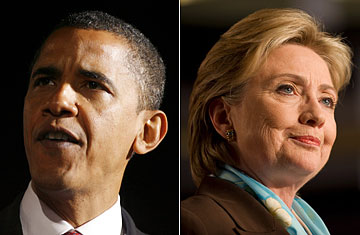
Obama took Oregon, Clinton took Kentucky
With the split results from the Oregon and Kentucky primaries Tuesday night, the Democratic Party will now begin to bring its nominating race to a quick close in ways that are at once both completely familiar — and utterly unprecedented.
The familiar part belongs to Hillary Clinton, whose lopsided, 35-point victory in Kentucky will help her keep making the case that Obama cannot appeal to key working-class voters, but will leave her short of the pledged delegates she needs to secure the nomination. While she will likely valiantly fight on in the remaining contests of Montana, South Dakota and Puerto Rico, she will soon join the ranks of other Democratic also-rans, both from this cycle and cycles past, who lacked the money, staying power and delegate totals needed to keep their dreams for the top spot alive. Closing down a campaign is an unpleasant and, if money is a problem, sometimes abrupt process; and to many campaign operatives, a painfully familiar one.
The unprecedented part belongs to Barack Obama, who is on the verge of becoming the party's first insurgent nominee to knock off an establishment front-runner since 1976, when a Georgia peanut farmer named Jimmy Carter came out of nowhere to capture the nomination. Obama's achievement is historic in more ways than just skin color: soon, he will have overcome a front-runner who was, at least at the start, better organized and better funded and who shared a last name with the party's master strategist and two-term President. Next come daunting tasks; his campaign is about to grow rapidly, doubling or tripling in size as it prepares to take on valuable refugees from the losing camp, raise several hundred million dollars, find a vice president, plan and execute a convention in Denver and then mount a fall campaign — all in the span of just about 90 days.
And in between the unprecedented and the familiar, it is plain to see, with each passing day, all the various parts of the normally far-flung party establishment pick themselves up and then realign and reform under Obama's banner. Labor unions, interest groups, party fund raisers, national committeemen and -women, elected officials and of course the remaining superdelegates — one by one, they are moving in Obama's direction, both because the outcome is no longer in doubt and because no one wants to be the last to come on board. Party fund raisers started this process last week; others will follow in the next two weeks. The intramural animus of April and early May could seem like ancient history by late June.
Clinton capped her win in Kentucky, where she took two out of every three votes, with an unbowed, Churchillian promise to fight on. "This continues to be a tough fight and I have fought it the only way I know how — with determination, by never giving up and never giving in," she said. But there were signs from her camp that the search for an exit would soon be under way; she has toned down her criticism of Obama, and various Democrats close to the Clinton camp hinted that the New York Senator may at least be positioning herself for a future role in the Obama campaign. Earlier this week, Clinton operatives took umbrage at Obama's plan to take a victory lap in Iowa Tuesday night, noting that such in-your-face declarations only alienate women voters who may feel that that, once more, a man had deprived a woman of a sure thing — voters Obama would need in the fall. That's partly party psychological war, of course, but it seemed to have some impact as the Obama camp toned down its Mission Accomplished moment in Iowa.
During that gathering, where Obama spoke before his 58%-42% victory in Oregon had been made official, the candidate praised Clinton as "one of the most formidable candidates to run for this office," praising her "committment and courage' over 35 years and congratulating her on "shattering myths and breaking barriers." He added: "Some may see the millions of millions of votes cast for each of us that evidence that our party is divided. I see it as proof that we have never been more united."
